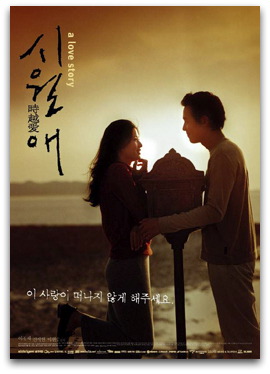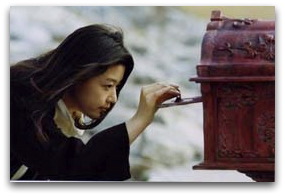Siworae/Il Mare (The Sea)
03/24/2006 11:46 Filed in: Movies and Television

In the meantime, I highly recommend viewing the original South Korean version if you find it being shown somewhere or if you can pick up a copy on eBay which is where I found my copy. A number of the Far East films I've obtained from eBay have been bootlegs, but I was pleased to see that my copy of Siworae was not. However, my RCA DVD player is quite finicky with Asian-made DVDs, and I had to watch the movie on my PowerBook where I viewed it without any problems.
I can set up the plot for you and give away the movie's "gimmick," but that's all that I can do. Anything more would spoil the story. Even giving away the gimmick seems unfair, but otherwise, why would you want to see this movie just based on my telling you to?
The movie begins with a young woman, Eun-ju moving out of a house on the sea shore and a new resident, Sung-hyun (a construction worker) moving in. As Sung-hyun begins to settle in, he receives a letter from the previous owner asking him to forward her mail. The problem is that Sung-hyun is actually the first owner of the house which was just built for him by his famous architect father. As the two continue to exchange letters, they not only begin to draw closer, but they also realize that their letters are going through time and they are writing two years apart.
This is enough to set up the story, and to tell you more would be to give too much away. Exactly how the letters are able to transverse time is not exactly explained. Is the red ornamental mailbox outside the house enchanted? Or is the little dog, "Cola" who is cared for by both residents some kind of magical link? Who knows? One thing I've observed in watching quite a few Asian films in recent years is that there's no Western obsession with how things "work." As opposed to our stories in which we want good and logical explanations for anything seemingly supernatural, Asian culture is content to let magic remain a mystery, a given part of the world as they know it. What's interesting is that often when these movies get remade for American cultures, there is an attempt to explain the reason behind supernatural events for Western audiences. A prime example is the film Juon which was remade into the American thriller, The Grudge. In the original, there's no attempt to explain the supernatural events. In the remake we're given an explanation.

The cinematography is extremely well done in this film. The use of a steady cam in many of the scenes creates movement around characters that are standing still and enhances the feeling of getting caught up in the emotions of the scenes. Food and cooking is a minor theme throughout the movie, but the way these scenes are shot, it made me wonder if the cinematographer or perhaps the director had experience with cooking shows. If you watch this movie you'll understand what I mean.
If you're not used to watching Asian movies, you might find the pacing a bit slow, but the need to follow the subtitles will be enough to keep you engaged. The subtitles themselves were obviously done by someone whose native language was not English, but the dialogue was still easy enough to follow nonetheless.
Il Mare is Italian for "The Sea." This is the name that Sung-hyun gives to the house his father has built. I'm not sure if the Korean word, Siworae means "the sea" or if it means "A Love Story." Perhaps someone can tell me. All three titles are on the packaging of the DVD. Again, I recommend this movie for you to see right now, and it will be interesting to see how The Lake House compares to it when released later this year.









